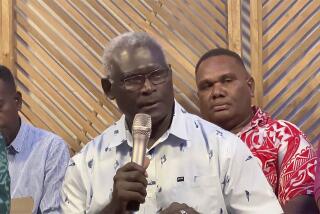President Drops Election Bid in Indonesia
- Share via
JAKARTA, Indonesia — President B. J. Habibie withdrew his bid for election today after Indonesia’s highest decision-making body refused to endorse his performance as chief executive.
The secret ballot by the People’s Consultative Assembly, which was the equivalent of a no-confidence vote, gave a huge boost to Habibie’s main rival, Megawati Sukarnoputri, increasing her chances of being selected president by the assembly later today.
Habibie’s hope for election in effect ended with the assembly rejection, making his withdrawal a gracious formality. The ruling Golkar party decided later not to field its own candidate, but its 120 votes will be key in determining who will be the next president.
Habibie’s decision was announced by assembly leader Amien Rais.
In another significant vote, the 700-member assembly endorsed East Timor’s decision to secede from Indonesia. Habibie had been widely criticized here for giving the territory a chance to opt for independence in a United Nations-supervised referendum.
Anti-independence militias in East Timor unleashed a campaign of terror that resulted in hundreds, perhaps thousands, of deaths and widespread destruction after the Aug. 30 vote. It took an Australian-led international peacekeeping force, dispatched last month, to restore order in the territory.
The assembly’s decision begins a long transition in which the remaining two battalions of Indonesian troops will withdraw from East Timor and administration of the territory will be formally turned over to the United Nations. Statehood may still be two or three years away, U.N. officials said.
The assembly’s 355-322 vote to reject Habibie’s defense of his 17 months in office was a stunning repudiation of the German-educated engineer, who ushered in reforms but never gained the electorate’s trust or support. As vice president, Habibie was elevated to the presidency in May 1998 when his predecessor, Suharto, was driven from office by protests after 31 years in power.
Megawati, 52, the popular leader of Indonesia’s political opposition, is the daughter of the nation’s first president, Sukarno. Her Indonesian Democratic Party in Struggle won 34% of the popular vote--the largest block among parties competing--in June assembly elections. Habibie’s party won 22%.
Abdurrahman Wahid, 59, the venerated but ailing leader of a Muslim organization with 30 million members, has widespread support among the powerful moderate Islamic community.
Many Indonesians greeted Habibie’s political demise with relief: The presidential campaign increasingly had taken on a tone of “anybody but Habibie.” The markets soared today on news of the latest events, with the Jakarta Stock Exchange gaining nearly 12% in value and the local currency, the rupiah, strengthening 6% against the U.S. dollar.
Although the powerful Indonesian military had no initial comment on the possibility of a Megawati presidency, it has pledged to remain neutral and support the next president. Under the constitution, the military plays a role in Indonesia’s political affairs and has 38 seats in the assembly.
Senior military commanders were never enamored of Habibie, 62, and historically have had a good relationship with Megawati. If Megawati is to win the necessary 351 assembly votes for election, the 38 nonelected seats held by the military, and defections to her camp from Golkar, will be crucial.
Political analysts doubted that the military will react negatively to the latest developments. One diplomat told army commanders this week, “If you even think about a coup, the doors you hear slamming shut will be those of foreign investors in Indonesia.”
Throughout Tuesday, thousands of Habibie and Megawati supporters rallied in the streets of this capital. Traffic ground to a halt in some areas and many businesses closed in anticipation of violence.
But unlike clashes last week between police and demonstrators that left 200 people injured and 75 under arrest, Tuesday’s rallies in Jakarta were peaceful. Megawati supporters have threatened revolution if their candidate does not win the presidency; Habibie’s withdrawal thus appeared to diminish the likelihood of widespread civil unrest.
As Habibie’s political fortunes appeared to worsen by the day, most Indonesians had already accepted the likelihood of his defeat, though Reuters news service reported that about 1,000 supporters went on a rampage and torched buildings in the town of Ujungpandang on his home island, Sulawesi.
Inside the parliament building where the assembly was meeting here, the result of the no-confidence vote was greeted by wild applause and cheers among Habibie’s opponents and by tears and prayers from his supporters.
More to Read
Sign up for Essential California
The most important California stories and recommendations in your inbox every morning.
You may occasionally receive promotional content from the Los Angeles Times.













